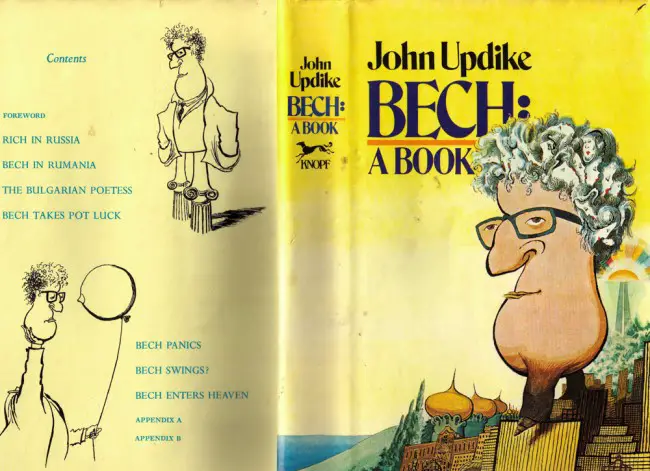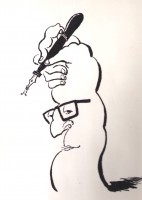
Bech: “Rich in Russia” (1969)
Reading John Updike’s Complete Stories
 This series is a re-reading of John Updike’s short stories in the wake of the publication of “The Collected Early Stories” and “The Collected Later Stories,” the twin-volume set by the Library of America (2013). A comprehensive table of the complete stories with links to each story summary appears below. The commentaries include the Maple and Bech stories, most of which are excluded from the Library of America edition. Contact the editor for questions, debates or corrections. A hyperlinked list of the compete stories appears below.
This series is a re-reading of John Updike’s short stories in the wake of the publication of “The Collected Early Stories” and “The Collected Later Stories,” the twin-volume set by the Library of America (2013). A comprehensive table of the complete stories with links to each story summary appears below. The commentaries include the Maple and Bech stories, most of which are excluded from the Library of America edition. Contact the editor for questions, debates or corrections. A hyperlinked list of the compete stories appears below.![]()
[“Rich in Russia,” written in Ipswich in 1970, was published in the Jan. 31, 1970 issue of The New Yorker, collected in Bech: A book and The Complete Henry Bech.]
“Rich in Russia” is the first of the seven stories that make up Bech: A Book, the first Bech collection, published in mid-1970, and ostensibly our first encounter with John Updike’s Jewish alter ego. But it was the fourth he wrote in the cycle, five years after “The Bulgarian Poetess,” a minor classic, gave Updike the notion that he was onto something. “Rich in Russia” is not among the best, and reads too much, down to the appendix full of journal entries, like Updike’s recap of the month-long tour of the Soviet Union he took with John Cheever, at the State Department’s expense, in 1964.
Cheever or anyone like him is excised from Bech’s trip, letting Bech have the stage all to himself (a complaint Cheever had made of Updike during their trip: Updike wanted to hog the attention). Aside from the travelogue tales of the story, which provide the usual surprises and pleasures of Updike’s laser eyes and trysts with language (“Aeroflot a feast afloat,” “Time different here, steppes of time, long dully lit terminal , empty of ads,” as if for westerners ads, appearing with unfailing regularity, were an element of time), two tensions carry the story: his relationship with Kate, his translator, whose affection he realizes too late, and having too much money. He’d been given a “stack of ruble notes” by his hosts. But there was nothing to spend it on. Bech’s mission, with his translator, is to “spend, spend.”
“It’s the Keynesian way. We will make Mother Russia a consumer society,” he tells Kate. “[P]lug me into the nearest socket and I spout red, white, and blue,” Bech writes in his journal. This is his way of Americanizing his trip. The Soviet Union in 1964 was a drab place that mocked consumerism. But that’s the joke. How to spend 1,200 roubles in a matter of days. The exercise offends Kate, as do many of Bech’s observations. “You treat my country as a picnic,” she tells him, as they hop from Kazakhstan to the Caucasus to Armenia tio Tolsty’s estate in Yasnaya Polyana, with never a mention, incidentally, of those provinces’ occupation and repression under Soviet rule. The absence of Bech’s political consciousness, his indifference to searching and describing more than the surface of things, the objects of his immediate surroundings, is striking. The attention is on spending, an impulse as shallow, if you’ll allow the anachronism, as George W. Bush’s exhortation to the American people to “Fly and enjoy America’s great destination spots. Get down to Disney World in Florida,” 16 days after the attacks. Bech would have nodded approval. It’s something he understands, because the larger questions–human rights, dissidents, the fall of Khrushchev–are not much on his mind. He and Kate finally discover the most efficient way of exhausting the stash: he buys a stash of furs for friends and family back home. Bech, oblivious to human rights, is not about to sweat over animal rights. “Each pelt, its soft tingling mass condensing acres of Siberia…” It’s the Ugly American, throwing his money around.
The closest he comes to scratching beyond the surface offered him is when he wonders about his likes: “Where are the real artists, the cartoonists who fill Krokodil with fanged bankers and cadaverous Adenauers, the anonymous Chardins of industrial detail? Hidden from me, like missile sites and working ports. Of the Russian cake they give me only frosting.” He sees secrets everywhere, but he’s not so inquisitive, not even with Kate, as to wonder what might be hidden. “Bech did find a quality of life— impoverished yet ceremonial, shabby yet ornate, sentimental, embattled, and avuncular— reminiscent of his neglected Jewish past.” But he doesn’t seem interested in connecting even that Jewish past to his present surroundings beyond the look-see, the jot-down and the move on.
The relationship with Kate fluctuates between tenderness and usury. She probes. Bech doesn’t react much, to the point that Kate wonders if he’s gay. He insistently tells her no. say, “Kate, you’ve never read my books. They’re all about women.” “Yes,” she said, “but coldly observed. As if extraterrestrial life.”
At the airport, “He went to kiss Ekaterina on the cheek, but she turned her face so that her mouth met his and he realized, horrified, that he should have slept with her. He had been expected to. From the complacent tiptoe smiles of Bobochka and Myshkin , they assumed he had. She had been provided to him for that purpose. He was a guest of the state. ‘Oh Kate, forgive me; of course,’ he said, but so stumblingly she seemed not to have understood him. Her kiss had been colorless but moist and good, like a boiled potato.” The emphasis is mine. The line begs the question: is that what Kate thought? Is it what she understood, but did not think? Not questions either Bech or Updike are interested in probing. We’re left with twin objectifications: of Kate, and of Russia, with none of the lyricism of “The Bulgarian Poetess.”
John Updike: The Complete Stories (Click on Links for Summaries and Analyses)
| Title | |||
|---|---|---|---|
| Ace In the Hole | |||
| Friends From Philadelphia | |||
| A Game of Botticelli | |||
| Tomorrow and Tomorrow and So Forth | |||
| Dentistry and Doubt | |||
| Snowing in Greenwich Village (The Maples) | |||
| The Kid's Whistling | |||
| Toward Evening | |||
| Who Made Yellow Roses Yellow | |||
| Wife-wooing (The Maples) | |||
| Giving Blood (The Maples) | |||
| Twin Beds in Rome (The Maples) | |||
| The Bulgarian Poetess (Bech) | |||
| Bech in Rumania | |||
| Bech Takes Pot Luck | |||
| Rich in Russia (Bech) | |||
| Bech Swings? | |||
| Bech Panics | |||
| Bech Enters Heaven | |||
| The Gun Shop | |||
| Believers | |||
| How to Love America and Leave It at the Same Time | |||
| Nevada | |||
| Sons | |||
| Daughter, Last Glimpse Of | |||
| Ethiopia | |||
| Transaction | |||
| Augustine's Concubine | |||





